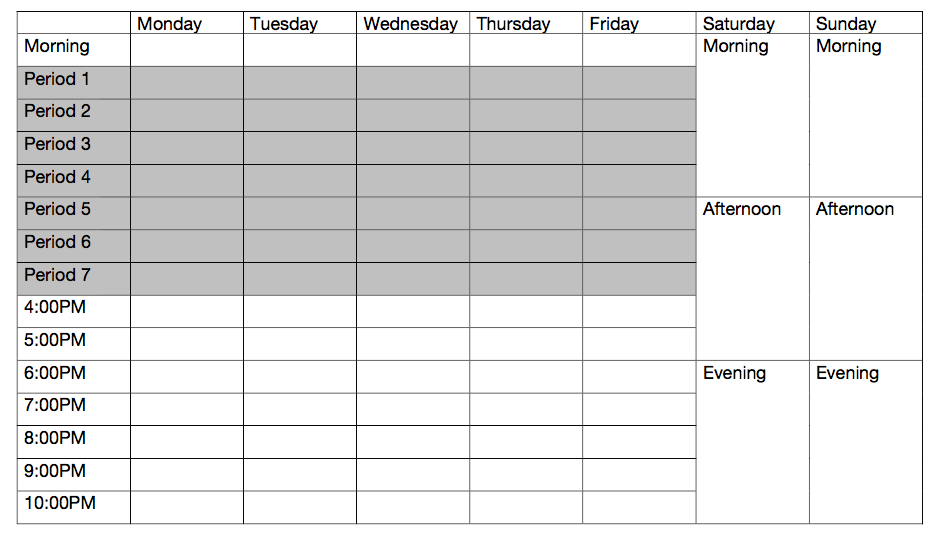When I feel overwhelmed by life, I just want to lie on the couch and watch videos.
Since I’m my own boss, I could easily do this. The temptation is always there. But unless I’m having a really bad day, I try my best not to. Why?
Because I know I’m only making life harder for my future self.
For every trashy show that I watch, I’m adding an extra dollop of pain, suffering and regret into my future.
This is why I always try have a rough plan for the day.
The benefits of rough planning
When I have a rough plan, I can usually transcend the slump and break the inertia.
Having a plan is like clearing a really messy path so you can walk through it. Plans makes life easier, especially on those days when you don’t feel so good. A plan gives your day structure. It focuses your mind on what you need to do. This means you’re less likely to get derailed.
The planning process also forces you to prioritise. It gets you thinking, “How do I want to use my time?” and “What is the most important thing I need to do this week? Today? In the next 10 minutes?”
Most of the time, I feel better when I follow my plan. Even if I only manage to knock off a few things, I figure that I’ve done something. And doing something is infinitely better than doing nothing.
Structure your day like a child’s
In the book Getting it done when you’re depressed, Julie Fast suggests we need to structure our day like a child’s. She says:
“Children are easily distracted by all that goes on around them. Having structured meal times, play times, television times, and bed times can create a calm and balanced child, as opposed to the cranky and difficult child who flounders with little to no structure. Having the same kind of structure in place can work for you, too.”
Some students prefer to wing it
Some students don’t like the idea of planning because it seems difficult to do. If that’s you, I get it. I used to feel the same way.
I remember being a PhD student and seeing other students and professors with detailed colour-coded plans for their research projects. I wanted to have a pretty plan on my office wall, too! But I wasn’t sure how to do it.
So with the help of my PhD supervisor, I created a pretty plan. It was a Gantt Chart. It took several hours to create and it looked amazing. When I stuck it up on my office wall, I felt like an absolute champion. But this feeling was short lived . . . why?
Because I didn’t follow my plan.
Needless to say, this made me feel like a loser.
What I didn’t realise at the time is that planning (and sticking to a plan) is a skill. It requires practice. Plans also need to be constantly tweaked.
My top study planning tips
Since those days, I’ve developed the practice of planning. My plans are messy but they do the job in helping me to complete my projects.
Here are my top six planning tips to help you get stuff done and stay on track during tough times:
1. Keep it simple
Don’t try to create a study plan that looks like a work of art. This will be a waste of your time and energy.
In the 1980s TV show Red Dwarf, the character Rimmer fell into this trap. In one episode, Rimmer spent several weeks creating his revision schedule for his astronavigation exam. Every hour of ever day was divided into different study periods. Each period was painted over in watercolours with a different colour to represent each topic.
The problem was it took Rimmer 7–8 weeks to create this study plan. By the time Rimmer had finished the plan, his exam was only a week away. This meant he had to cram months of revision into a single week. So he spent another 2 days creating another study plan. Now he had to cram 3 months of revision into 5 days! It was a complete disaster.
So don’t be like Rimmer. Don’t spend forever creating your plan. Keep it simple.
What does a simple plan look like?
It could be some post-its notes on a wall, a mind-map or a to-do list. There are no hard and fast rules when it comes to planning. You just need to get things out of your head and onto paper, and ideally set some deadlines for when you’ll get stuff done by.
2. Don’t schedule stuff back to back
If every minute of every day is accounted for, you’re going to feel overscheduled and stressed out. Trust me, this isn’t a fun way to live. Studying/working without breaks is demoralising! This is why it’s super important to factor in some buffer time in between each activity (even if it’s just 5 minutes).
3. Don’t be ruled strictly by the clock
Let’s say you planned to study a specific subject for 30 minutes at 4pm sharp. You look at the clock and it says it’s 4.06pm. But you haven’t started. Does this mean you’ve botched your plan and you can’t make a start? Not at all!
Cut yourself some slack. Doing 24 minutes of study on a subject (instead of a full 30 minutes) is better than doing nothing.
4. Work out your calendar mindset
In the book Time Smart, Dr Ashley Whillans talks about the concept of ‘calendar mindsets’. She says there are people who tend to be ruled by the clock (clock-time people) and those who prefer to have events shape their schedule (event-time people).
She argues figuring out your calendar mindset can help you to plan your day better and make it more likely that you’ll follow through with your plans. Dr Whillans states:
“Clock-time people use schedules that are defined by the hours of the day – the clock. They don’t move on from an activity merely because it feels like the “right” thing to do; rather, they move on because it’s 1.30 and that’s when they’re slated to move on. They are more likely to stick to a routine and set time-dependent goals for their work and leisure (I will exercise between 5 and 6 every morning) . . .
In contrast, event-time people allow events to shape their schedule. They might set up a meeting, but it will last as long as it lasts; it may run fifteen minutes or ninety, regardless of the scheduled time. Event-timers don’t call you at 1.30; they call “when I’m finished with lunch.”
If you’re a clock-time student, you may be better suited to using a template with one hour or 30 minute slots for the week. All you need to do is fill it in with your extra curricular activities, factor in some free time and schedule in your study time around that.

For event-time students, this approach will probably feel too restrictive and authoritarian. Some systems and methods that match event-time mindsets include the Many Lists method, Getting Things Done and Tiny Habits.
5. Make your study plan crispy
By crispy, I mean specific. If your study plan says Study human biology, this is too vague for your brain. Chances are you’ll waste time trying to future out what to do.
In contrast, if your plan says Active recall with flashcards (topic: digestive system) or Watch Khan Academy video on digestive system, your brain knows exactly what it needs to do. You can get straight into it.
6. Be flexible
If your plan isn’t working for you, tweak it. A plan is there to help guide you. It shouldn’t be a source of stress.
Treat your plan like your going shopping for shoes. If a pair of shoes feels too tight, you try on another pair. And you keep trying on shoes until you find a pair that feels good. Similarly, if your plan doesn’t feel right or you’ve been overly ambitious with what you thought you could achieve in the day, re-jig it. Cull some activities. Try something else. But whatever you do, don’t throw it out all together and do nothing.
This is why I find planning with a pencil or on a whiteboard works best. It’s much easier to edit your schedule with these materials.
To sum up
Don’t overthink your study plan. Just scribble one out, make it crispy, be open to tweaking it and then swing into action. And most importantly, don’t expect to do any of this perfectly. Remember, a messy plan is better than no plan.





